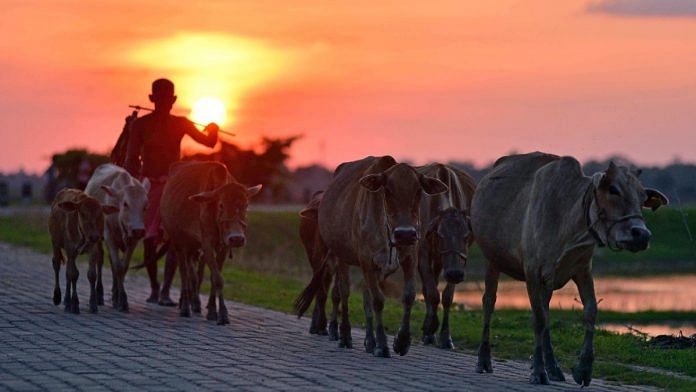New Delhi: Cow hostels, cow products, encouraging entrepreneurs to set up cow-related businesses, and providing financial assistance to outfits working for the welfare of bovines — these are measures the Modi government is considering as part of a scheme to resolve the stray cattle problem rampant throughout the country.
The department of animal husbandry and dairying — which falls under the ambit of the Ministry of Fisheries, Animal Husbandry and Dairying — has sought the Union government’s approval for its ‘welfare of cows’ scheme.
The move, a senior ministry official said, is aimed at encouraging farmers not to abandon their livestock on the streets upon completion of their productive life, minimising “stray cattle and human conflict”, and providing additional income to farmers through by-products.
The official confirmed to ThePrint that the minister concerned has given “in principle approval” to the scheme, adding that “in principle approval from the department of expenditure is being obtained separately”.
“The total proposed cost of the scheme is Rs 494 crore, spread over five years from 2022-23 to 2025-26. It will include funding (for) cow hostels, livestock tourism park, cow products…,” the official added.
The official further said that the scheme is meant to “save the cow progeny” through utilisation of their products and by-products. “The scheme will also envisage conversion of waste into wealth through utilisation of technology. Hence, it will help in minimising stray cattle and human conflict and provide additional income to the farmers.”
The issue of stray cattle has kept several state governments on their toes, even turning into a poll issue. For instance, Uttar Pradesh Chief Minister Yogi Adityanath had declared in February — ahead of the assembly polls — that the state government would give Rs 900-1,000 each month to farmers who adopt or take care of stray cattle if the BJP returns to power in the state.
Also Read: Apps now sell cows, but getting a farmer to buy one ‘before milking it once’ is a challenge
50 lakh homeless cattle
According to the animal husbandry ministry, India has around 50 lakh homeless cattle (per the 20th livestock census conducted in 2019).
“These animals are mainly living on the road in search of food and water. A total of 32 states and UTs have banned cattle slaughter and therefore, the farmers are not able to sell them. There are reported incidents of accidents and crop damage too. These animals are mainly dry cows and male animals,” a note prepared by the ministry and accessed by ThePrint.
The note added that state-run and private gaushalas (cow shelters) that accommodate homeless animals are finding it difficult to continue their work owing to a shortage of funds. Though some states are providing financial assistance in this regard, this assistance is “proving to be inadequate” in supplying food and nutrition to the animals, it further said.
According to the note, the productive life of cattle lasts 10-12 years. With the mechanisation of agriculture having rendered male animals useless, unproductive cattle and male animals are a burden to farmers since they are not economically viable.
It goes on to add, “These unproductive cattle and male animals need to be maintained, if not slaughtered or (die) natural death, till the end of life due to public sentiments and religious reasons. During this period also, the animals are to be provided with veterinary care so that the animals don’t suffer from diseases and injuries which also is a costly affair.”
Aid to gaushalas, promoting by-products
The scheme proposed by the ministry envisages making gaushalas self-sustainable by promoting the production of by-products other than milk, such as cow dung and urine, which are then used in the making of various products.
“Organisations are trying to make products, however, the quantity is less and they do not have marketing support. Further, the technology needs to be leveraged to produce innovative products like Bio-CNG, Lignin (an organic polymer) and organic fertiliser etc,” said the note.
However, it point outs that these industries are in “very primitive stages” and need government support to promote their products.
One example cited in the note about by-products laying the foundation for sustainable businesses in this context is how “organisations are making efforts to use cow dung to convert it as Phosphate Rich Organic Fertilizer (PROM) to produce organic fertilisers using the same”.
Once green-lit, the proposed scheme will be implemented pan-India. Organisations, research institutions, non-government institutions (NGOs), gaushalas, individual entrepreneurs, trusts or societies, farmers’ organisations, and self-help groups, among others, will be eligible to avail the benefits of this scheme.
“The scheme envisages assisting the selected institutions who are working in the field. Also, during the selection of beneficiaries for training of cow entrepreneurs, SC and ST beneficiaries will be selected on priority as per the norms,” said a second ministry official.
The official explained that a statutory body constituted under the Prevention of Cruelty to Animals Act, 1960, and the Animal Welfare Board of India (AWBI) will function as the implementing agency for the scheme.
“Beneficiaries, like NGOs, will be selected through the criteria laid down by NITI Aayog for availing financial benefit from the government. As it is a central sector scheme, the scheme funding will be channelised though AWBI to the beneficiary. The panchayat system will be encouraged to create facilities to house stray cattle so that its by-products are made available to allied industries and (panchayats) can avail funding under the scheme,” said the second official.
(Edited by Amrtansh Arora)
Also Read: Faster mutations, heavy rains, crowded gaushalas — how lumpy skin disease spread like wildfire



